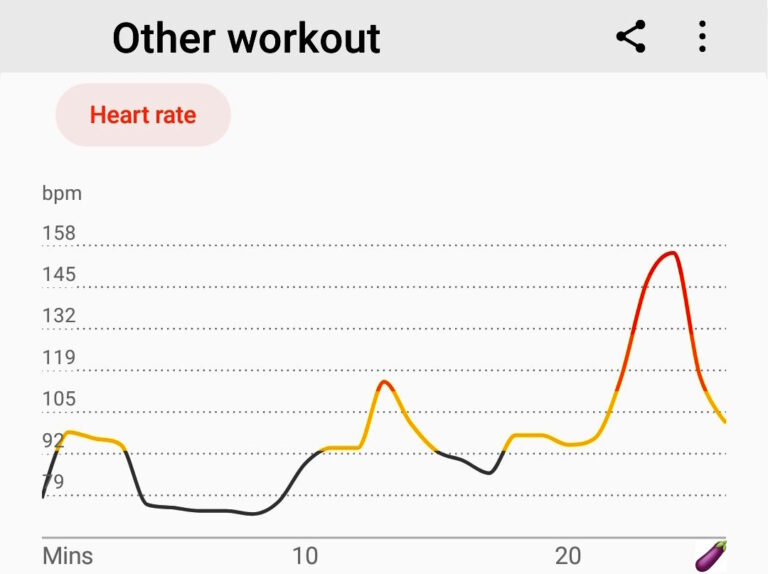TL:DR – Sex can double or treble a person’s heart rate, but this is a normal physiological response provided the rate goes back to normal within a few minutes.
Love might make your heart skip a beat, but love-making definitely gets it pumping. Indeed, sexual activity will inevitably raise your bpm, beats per minute, especially as a person approaches orgasm. A friend with a fake FitBit was curious about the trajectory of heart rate during sex and wore his monitor (around his wrist) in the bedroom one night. As he and his missus slid between the sheets, he set it to “other” workout and then synced the output from the monitor to his phone…the morning after.

My friend was astonished to see that his heart ultimately raced up to 156 bpm. That is within what the fitness app refers to as the anaerobic region. He was relieved to see that it fell to a near-normal resting rate within a couple of minutes afterwards though. But, that peak had him worried, especially at his age. So rather sheepishly he asked me, as his go-to-science friend, to check out the numbers.
I assumed he knew that during sexual activity, the body undergoes various physiological changes, including an increase in heart rate. It is normal for the heart rate to increase during sexual arousal and activity, and this increase is generally not a cause for concern in healthy individuals.

But, it was the orgasm bpm he was worried out. During orgasm, the heart rate typically reaches its peak, and in some people, it can exceed 180 bpm. However, this increase in heart rate is usually brief and does not pose a significant risk to health. 156 bpm during orgasm is within the normal range for sexual activity. And, the fact that his heart rate quickly returned to around 80 bpm within a couple of minutes is a healthy response and indicates that his cardiovascular system is functioning properly.
Certainly, there would be something to worry about if it had gone very high and stayed at that level for a prolonged period. Moreover, chest tightness and pain, stabbing or shooting pains in the left arm or pain in the neck or jaw would indicate a need to seek medical attention either urgently or sooner, rather than later.
As an aside, my friend finds it amusing that he does a lot more “steps” when he is alone than when he’s with his missus…now…I know some readers are going to think “friend…? Yeah, right!” But, it’s true.
Sexual activity, including arousal and orgasm, causes the release of hormones such as adrenaline, noradrenaline, and dopamine, which can increase heart rate. Additionally, physical activity during sex, such as thrusting or movement, also contributes to the rise in heart rate. The body also experiences increased blood flow during sexual activity, which places an additional demand on the heart to pump blood. All of these factors work together to increase heart rate during sexual activity.
Increased blood flow is necessary during sexual activity to deliver oxygen and nutrients to the muscles and tissues involved in the sexual response. This includes the genitalia, which require increased blood flow to become engorged and maintain an erection in men and to lubricate and swell in women. The increased blood flow also contributes to the overall sensations of sexual arousal and pleasure. Increased blood flow to the genitals facilitates sexual function and satisfaction.
During orgasm, the male heartbeat can exhibit variations. While some individuals may experience a sensation akin to their heart skipping a beat, it’s not a universal occurrence. The physiological response during orgasm involves a complex interplay of various bodily systems, including the cardiovascular system.
Typically, during sexual arousal and orgasm, there’s an increase in heart rate and blood pressure as a result of heightened arousal and the release of adrenaline. This can lead to palpitations or a perceived skipping sensation in some individuals. Additionally, the release of neurotransmitters such as dopamine and oxytocin during orgasm can also impact heart rate and rhythm.
However, it’s important to note that variations in heartbeat during orgasm can differ greatly from person to person, and not everyone may perceive or experience it in the same way. If someone experiences significant irregularities in heartbeat or has concerns about their cardiovascular health during sexual activity, it’s advisable to consult with a healthcare professional for further evaluation and guidance.